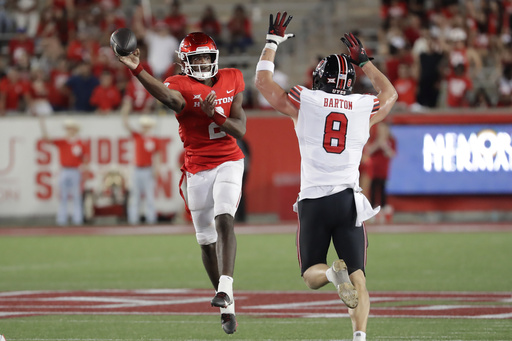
Utah’s Rivalry with BYU Reignited by Shift to Big 12
Utah’s transition from the Pac-12 to the Big 12 has rekindled its rivalry with BYU, marking the end of a 13-year hiatus. The return of this fierce competition, dubbed the “Holy War,” not only revitalizes football but also enhances rivalry across several sports.
The Big 12 has prioritized this matchup by selecting it as one of four protected rivalries, ensuring that BYU and Utah will face each other annually as long as they remain in the league. This renewal kicks off with a highly anticipated game on Saturday, where the No. 9 Cougars will visit the Utes at Rice-Eccles Stadium. The rivalry’s significance extends beyond the football field, impacting sports like basketball and volleyball, where the two schools will compete against each other twice a season.
Players and coaches alike are eager for the return of this competitive spirit that offers more than just bragging rights. BYU’s coach, Kalani Sitake, expressed enthusiasm, saying, “It’s a fun game to be part of, and I’m glad it’s back. I want our guys to enjoy every second of it.”
The rivalry is also fueled by the cultural and religious differences between the two schools. Utah, a public university, stands in contrast to BYU, which is affiliated with the Church of Jesus Christ of Latter-Day Saints, adding a layer of complexity to their matchups.
Success in athletics plays a crucial role in the rivalry’s intensity. Both programs have historically clinched conference titles at each other’s expense, with Utah achieving significant victories during their BCS runs and BYU claiming a national championship in 1984 after defeating Utah in Salt Lake City.
Chris Burgess, a former Utah player and now an assistant coach at BYU, recalls the pressures associated with these matchups. “You’re trying not to make the game bigger than it is, but it was just hard,” he said. “You know everybody on that side, and you want to win it.”
For locals who have grown up in Utah, the return of competitive games that impact conference standings rekindles the essence of their longstanding rivalry. “That rivalry from the time I entered this world was just ingrained in me,” said Kennady McQueen, a senior guard for Utah’s women’s basketball team. “I would just say it’s a huge part of the state of Utah. There’s extra juice for each team. Everything’s a little extra for that game.”
A notable characteristic of the rivalry is the interconnectedness among coaches across multiple sports, fostering mutual respect. Kyle Whittingham, current Utah coach and former BYU linebacker, has seen several of his ex-assistants, including Sitake and coordinators Aaron Roderick and Jay Hill, join the BYU coaching staff. Hill played under Whittingham as well.
Sitake regards Whittingham as a mentor and friend, acknowledging his influence on his head coaching role at BYU. “I have a lot of love for that program and a lot of love for the people there,” Sitake added.
Burgess shares similar sentiments, noting that his experiences at both institutions have deepened his appreciation for the rivalry. “Being on both sides has only intensified my love and respect for this rivalry,” he mentioned. “I can truly appreciate what it means for both fanbases.”
The landscape of college athletics changed when Utah departed the Mountain West Conference for the Pac-12 in 2011, disrupting the rivalry. During that time, Utah dropped BYU from its football schedule twice to accommodate games against teams like Michigan and Florida. Additionally, the matchup’s traditional late November date was pushed to September under the demands of the Pac-12.
Nevertheless, despite being separated by conference affiliations, the significance of the rivalry continued to resonate deeply within both fanbases. “Going through the program, seeing how everybody took the game and how serious it actually is around here with the fans,” said Utah running back Micah Bernard, “you get immersed in it, and I’ve been immersed in it.”
